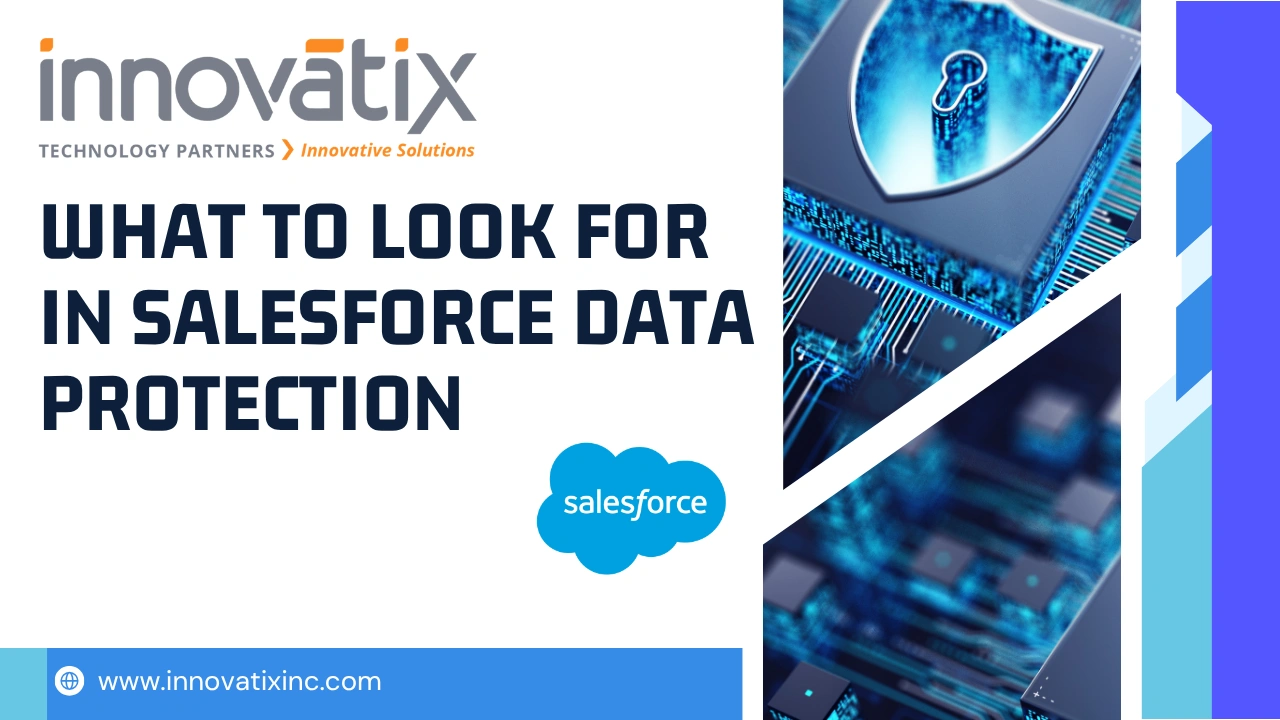Essential Factors to Consider for Salesforce Data Protection
With data breaches becoming increasingly common, organizations relying on cloud platforms such as Salesforce must prioritize robust data protection strategies. Salesforce, a comprehensive customer relationship management (CRM) platform, holds vast amounts of sensitive customer data that, if mishandled, could compromise customer trust and organizational reputation. In this blog, we’ll delve into critical Salesforce data protection practices that businesses should adopt to safeguard their information and maintain strong customer relationships. The Importance of Salesforce Data Privacy Data privacy extends beyond regulatory compliance—it is about building trust. Customers today are more informed and cautious about how their data is used and stored. Mishandling this data not only risks penalties but can also erode the trust customers have in a brand. According to McKinsey, companies that prioritize data privacy see up to a 20% boost in customer loyalty and trust. This data privacy commitment is essential, as it offers a competitive edge while ensuring adherence to frameworks like GDPR, CCPA, and HIPAA. Salesforce’s data privacy features are designed to help organizations enforce privacy standards, control access, and protect sensitive information across all touchpoints. From strict authentication protocols to data encryption, businesses must leverage Salesforce’s data protection capabilities to meet and exceed industry expectations. Below are essential areas within Salesforce data protection and privacy that organizations should consider when designing their CRM security framework. A well-defined Salesforce data security policy is the foundation of any effective data protection strategy. This policy should outline: A well-rounded Salesforce security policy enables organizations to establish a proactive approach to data protection, emphasizing secure access, data handling, and compliance. Data security in Salesforce offers various built-in tools and settings that protect data integrity and confidentiality: According to Gartner, organizations that implement these security measures reduce their risk of data breaches by up to 30%. Leveraging Salesforce’s built-in tools is a powerful first step in creating a secure environment for customer data. This Salesforce Data Security Model acts as a framework to allow definition of who should be accessing certain data and what operations they can execute on it. In this model, you must configure the contents of your profiles, permission sets, and your user roles to set granular access control. The design of a security model that is robust should guarantee protection of data right from the level of individual records to the more complex level of data sets. Any data protection strategy must include security awareness. In addition to security measures, employees should also be trained on best practices of Salesforce security to avoid human errors (which account for 95% of all data breaches), Gartner reports. Particularly, regular workshops and updates on the recent security threats and mitigation techniques can play a huge role in fortifying an organization’s readiness against a data breach. Salesforce offers tools to increase how their data is protected and its privacy, for example through Salesforce Shield. This suite includes: Companies that implement these tools can reduce compliance costs by up to 40%, as highlighted by a report from McKinsey. Innovatix Technology Partners excels in enabling data protection and privacy in Salesforce, ensuring that client information is securely managed and compliant with industry standards. Technology alone cannot fully safeguard data; it must be complemented by employee awareness. Human error accounts for approximately 95% of data breaches, as noted by Gartner. Regular security training and workshops are vital to ensuring that employees understand the latest security threats and know how to mitigate them. By fostering a security-conscious culture, organizations can significantly reduce their vulnerability to breaches stemming from human error. Salesforce offers a suite of advanced tools that enhance data security and privacy, especially through Salesforce Shield: McKinsey highlights that organizations leveraging these tools can cut compliance costs by up to 40%, as Salesforce Shield facilitates adherence to regulatory requirements while protecting sensitive information. Innovatix Technology Partners specializes in helping businesses integrate these tools effectively. Our Salesforce consultants ensure data protection mechanisms are tailored to your unique business needs, providing a secure, compliant, and efficient data environment. Handling large volumes of data securely is critical in a CRM environment. Salesforce data loading tools support data transfers without compromising data security or integrity. Data loading tools are especially valuable for organizations managing extensive customer information, allowing them to load, update, and delete records in bulk while ensuring consistency. When used correctly, data loading tools prevent data corruption, duplication, and loss. They simplify processes like importing and exporting data, minimizing the time and resources required for manual data entry. By streamlining these workflows, data loading tools contribute to a robust, efficient data management process in Salesforce. Salesforce data protection should not be isolated; instead, it should integrate seamlessly with an organization’s overarching IT security framework. Regular audits of Salesforce’s access logs, security settings, and integrations help detect unauthorized access and prevent potential leaks. Key practices include: A comprehensive approach to Salesforce data protection, embedded within broader IT security, fortifies the platform’s defense against potential threats. Salesforce’s commitment to data security has been recognized by multiple industry leaders, positioning it as a leading choice for organizations prioritizing data protection. Here are some insights: These insights reinforce the value of investing in Salesforce’s security and data protection features to achieve operational and reputational benefits. Conclusion Effective data protection within Salesforce is no longer optional; it is a strategic imperative for any organization that values customer trust and aims to remain competitive. Salesforce’s extensive suite of security tools, when combined with best practices in data protection and privacy, creates an environment where customer data is not only protected but also optimized for a superior user experience. Innovatix Technology Partners is your ideal partner in implementing and maximizing Salesforce’s data protection features. Our expertise in Salesforce implementation and staffing solutions ensures that your business can confidently manage customer data, comply with industry standards, and stay ahead of evolving security threats. We help organizations tailor Salesforce’s security features to their unique needs, offering both robust security measures and dedicated support. Contact Innovatix today to explore how we can fortify your






